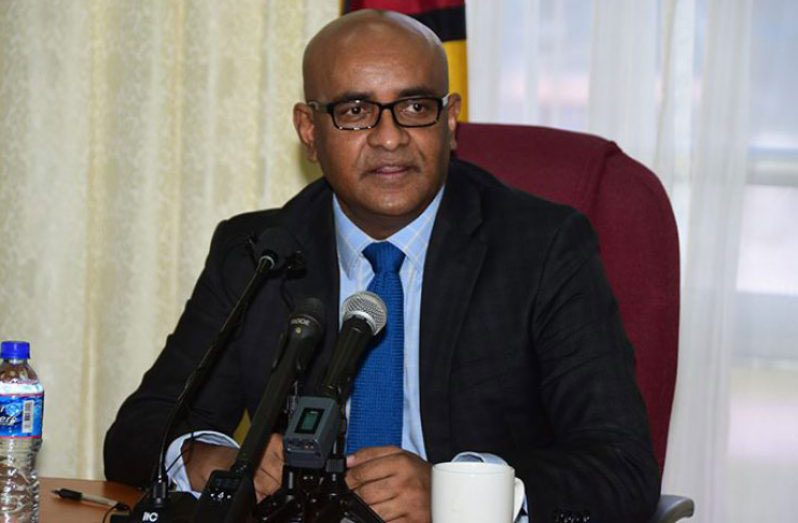…as Jagdeo pledges reforestation of ‘mined-out’ lands
AS Guyana remains on course for colossal transformational development, the government has committed to striking the balance between economy and environment.
At a press conference on Friday, Vice- President, Dr. Bharrat Jagdeo responded to criticisms relating to the removal of a stand of mangroves from a private plot of land in the vicinity of Versailles-Malgre Tout, West Bank Demerara.
“We had to give permission to clear 40 acres of mangroves, because there will be development along that fringe,” Jagdeo said. Reports are that the coastal vegetation, which primarily helps to cushion the impacts of the sea, was removed by a company named TriStar Incorporated, which is owned by Guyana-born Krishna Persaud, who has the site earmarked for developing a $100 million wharf, and an oil-and-gas shore base.
Jagdeo told reporters that it has been made clear that “from the mouth of the Demerara River to Wales, there shall be development.” In underscoring the importance of shore-based facilities and waterfront development, Jagdeo said that he is particularly pleased that the West Bank Demerara project is being pursued by someone who is Guyanese born.
“[It is] bringing back development for our people,” Jagdeo said, adding that once development of the West Demerara shoreline commences, it could easily boast of having the capacity to generate close to 30,000 jobs. The Vice-President made specific reference to the opportunities that abound with the construction of a new Demerara River Crossing, as well as its many interconnecting roads.
“When you go to the developed countries, both sides of their river are development,” Jagdeo noted, adding that going forward, investors will have to adhere to all of Guyana’s environmental regulations. “It’s a rule-based country,” the Vice-President said.
He said that even though some mangrove stands are being disturbed, mitigating efforts are being executed elsewhere, and the plants are being replaced with adequate infrastructure to guard against flooding.
As yet another move to mitigate Guyana’s carbon footprint, Jagdeo pledged the government’s commitment to replanting some 6,000 acres of land that have already been mined-out.
“Our plan is to grow Guyana, maybe in the next decade, to US$30,000 per capita. That’s when people will stop migrating and move back to Guyana. We have to grow this country per capita, and we can do so, keeping our environmental credentials intact,” the former president maintained.
He reminded his audience that during his tenure as Head-of-State, the People’s Progressive Party/Civic (PPP/C) administration had partnered with the European Union (EU) to execute a massive programme to improve Guyana’s mangrove forest. He said, too, that under the Global Climate Change Alliance Plus (GCCA+), Guyana was able to benefit from €5 million to combat the effects of climate change along the coastland.
Nonetheless, Jagdeo maintained that Guyana has to maintain a healthy balance between economy and environment, in order to develop sustainably. “We have to move our country forward, and our people,” Jagdeo said.
Similar sentiments were recently shared by Minister within the Ministry of Housing and Water, Susan Rodrigues, when she said: “If we want to take Guyana into the new and emerging sectors, and we want Guyana to become a next Dubai or a next Singapore, there are going to be tough decisions that we are going to have to make.”
She admitted that if one were to examine the recent “mangrove situation” in isolation, then it would be easy to consider it a disaster; however, she urged Guyanese to ensure that their opinions are formed within context.
“This is a 100 per cent locally-owned company that will be occupying that space; that will have the responsibility of ensuring the protection of our sea defence, and that we have enough sea defence. This is going to be somebody who is going to create hundreds of jobs and spin-offs from this investment,” Rodrigues posited.
“If we don’t create more shore bases here in Guyana, then the investors are going to look elsewhere,” she said, adding:
“They are going to create those shore bases in the nearest locations; Trinidad, and then all of the work will go to the Trinidadian people, and once again, Guyanese will lose out. So, we have to do a balancing act.”
She reminded that Guyana’s future is dependent on the country’s ability to pursue economic modernisation in a manner that is sophisticated and sustainable.
“We have to protect our environment, but we [also] have to ensure that we can get cheaper electricity for our people. We want to bring in the gas pipeline; there may be some destruction in that, but we have to balance,” Rodrigues reasoned.
In “striking a balance” and making the “tough decisions”, Rodrigues assured that the wellbeing of Guyana and its people will remain paramount. “Whatever decisions we make, will be carefully considered and we will balance the benefits with the sacrifices we have to make.”








.png)







